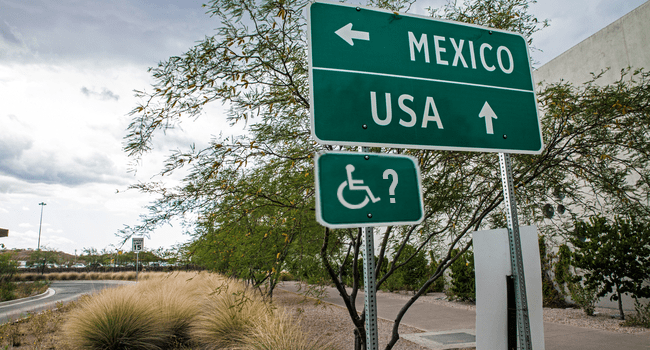Growing Up at the Intersection of Disabled and Immigrant
I am an immigrant with a disability. When I was five years old my parents decided to move our whole family from Mexico including five kids, two of whom have a disability, to the United States. My mother still talks about the decision that made her stay: having children with disabilities. She dreamed of something bigger for us, but immigrants are not eligible for many services including rehabilitation services and outside therapy services for children.
My siblings and I were enrolled in public schools. We were thrown into a world in which we did not know the language or culture and had no way of expressing our concerns or asking questions. I remember not being able to participate in what was occurring at school, and it took me longer than usual to learn my alphabet because I could not see the board or understand what the teacher was saying.
At five years old I did not have any advocacy skills, and I did not know about the Individuals with Disabilities Education Act (IDEA) or my right to a Free Appropriate Public Education (FAPE). And other than explaining that we lived in poverty, I could not tell my classmates why I could never leave the country or participate in certain activities.
I think the driving force that kept me focused and persevering through all of this was the support of my family. While the idea of disability as something to pity was present in my family, the support from my family, which I lacked in school, was everything. My siblings would help me with homework and chores. We came up with modified games so that I could play and participate. My siblings taught me daily living skills such as how to tie my shoes and how to dance all the latest moves. They became the service providers that I could not receive out of school due to lack of money and immigration status. Overall, my family had my back, because what else do you have when you know that at any minute everything can be taken away?
There was always a fear of deportation back to a place that I vaguely remembered, where “people like me” didn’t go out in public alone. Where the only opportunity was to be a beggar or live with your family your whole life.
Eventually I received services through an Individualized Education Program (IEP), but I now realize how low quality those services were. And at the time California had healthcare services for undocumented children. This was a much-needed service for my family, but it meant if I got sick, I would have to take a whole day off from school to account for the wait time at the understaffed, overcrowded free clinic designated for our care. Once I learned English, I’d also have to take days off from school to translate for my parents.
It wasn’t until my senior year in high school that I came to realize what being undocumented and having a disability really meant. Due to my status, I was told I would not be able to get financial aid, or get accepted to college. My teachers knew about vocational rehabilitation services but decided not to inform me of them because I was not eligible.
Many of my friends who were in similar situation had alternatives, as they could be employed doing labor that I could not do because of my disability. I had nowhere to turn and I was beyond frustrated.
It felt like pure fate that I received my green card in the middle of my senior year in high school. By this time most college applications had been turned in but there were private schools that had later application dates. So, I ended up applying to a private school and getting in. It was not easy for me, being at the intersection of being an immigrant and having a disability, because of all the obstacles to services and programs that would have benefitted me, but it made me who I am today. My life is what it is because my parents decided to make a very difficult choice, and I am bearing the fruit of that decision.
About Rooted In Rights
Rooted in Rights exists to amplify the perspectives of the disability community. Blog posts and storyteller videos that we publish and content we re-share on social media do not necessarily reflect the opinions or values of Rooted in Rights nor indicate an endorsement of a program or service by Rooted in Rights. We respect and aim to reflect the diversity of opinions and experiences of the disability community. Rooted in Rights seeks to highlight discussions, not direct them. Learn more about Rooted In Rights



Yes my friend, YES!! This is fabulous and I’m sure your family and all who know you are so proud of you as your NFB family is.
Your writing are very good,when your IEP ? And what year ?
You should write book
When I went to school there no, IEP. Only dumb classes.
When son was in school He had IEP . But it not easy . He has only basic problems not reading good .
Where town you go,to school.
Good luck. ,, I willl looking for your book! Some day!
Denise
While I am sorry for your disability and glad that you have a successful life, don’t blame our system for services you were not allowed to receive. You were here illegally. Your parents had many years to go the route of legal citizenship. I hope that you will encourage and help others that are here illegally to get their citizenship.
Conchita Hernandez, your story truly touched my heart. I’m thrilled you succeeded in life and currently teaching and helping other kids with disabilities. I am currently a special education teacher with LAUSD, and l understand what immigrant parents have to endure in navigating the world of IEPs, etc. Congratulations!!!!!
Pat: The “route of legal citizenship” is not doable for the majority, unless they pay around $10,000 (sometimes more) to a specialized immigration attorney and wait 10 to 15 years. Before you make comments of that nature, I invite you to educate yourself. My daughter was denied citinzhip because of her Menta Illness
https://www.uscis.gov/policymanual/HTML/PolicyManual-Volume8-PartB-Chapter7.html#S-A
Pat, the author was a child when she arrived in the US. Is it justice to deny services to a child who has no control of the situation in the first place?
Conchita,
Thank you so much for sharing your story. You should definitely write a book!